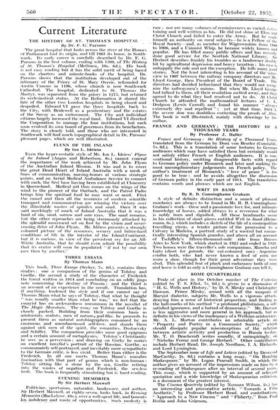SOME QUARTERLIES
Pride of place in the October number of The Criterion (edited by T. S. Eliot, 7s. 6d.) is given to a discussion of " H. G. Wells and History," by D. S. Mirsky and Christopher Dawson. Prince Mirsky, armed with all the weapons of Marxist dialectic, subjects Mr. Wells to a vigorous attack. denying him a sense of historical proportion, and finding as the hall-marks of his method " a profound philistinism, a self- satisfied ignorance, and a hatred of democracy." Mr. Dawson is -less aggressive and more general in his approach, but as definite in his views of the inadequacy of a Wellsian aristocracy. Mr. A. L. Morton contributes an admirable article on "Property and Poetry in a Communist Society," which should dissipate popular misconceptions of the relation between artistic activity and production in Russia to-day. Mr. T. 0. Beacheroft writes soundly, if uninspiringly, on
Nicholas Ferrar and George Herbert." Other contributors include Herbert Read, Dr. Joseph Needham, I. A. Richards, and Lord Lyinington.
The September issue of Life and Letters (edited by Desmond MacCarthy, 2s. 6d.) contains a long essay,. " On Reading Shakespeare," by Mr. Logan Pearsall Smith, in which the author gives an account of the impressions made on him by a re-reading of Shakespeare after an interval of several years. This essay, which is supported by an amount of relevant quotation and a wide knowledge of Shakespearian criticism, is a document of the greatest interest. The Cinema Quarterly (edited by Norman Wilson, 2s.) has an interesting and provocative article, Towards a Film Aesthetic," by Professor Herbert Read, and contributions, Approach to a New Cinema " and "Flaherty," fiorn Paul Retina and John Grierson,














































 Previous page
Previous page